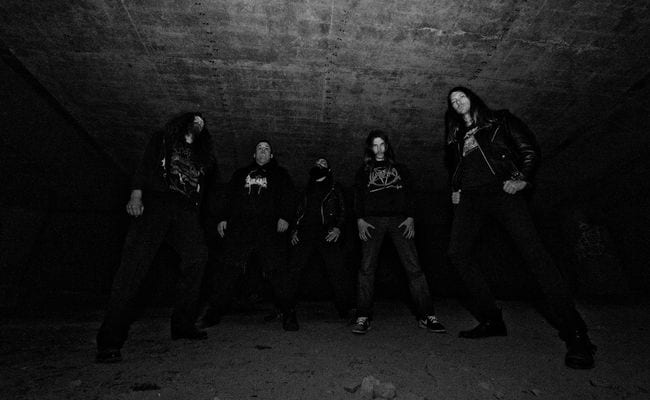
These Washington state cats must’ve spent some long after school sessions listening to good ol’ underground records from days of yore: the kind of dark, depraved and sonically solid darkness that bands in the late-1980s and early-1990s whipped up, back when underground metal was in its prime and it seemed like people were only too hungry for the next subterranean dwellers to unleash something unique. You know, you remember when bands all sounded a little different.
The dudes from Black Breath knew that and apparently remember—or at least their DNA does. And they took that idea and made something new, something heavier than your mind can comprehend on a good day but which your heart consistently desires as you seek truth and continue your quest for the ultimate in blackened rock. This is stuff that you know in your lizard brain, the kind of stuff that you heard before you were born, that existed before any of us were born but which now slithers from your speakers and makes you stand tall with fists raised in excitement.
What makes Black Breath great is that they’re not a band bent on sounding like it’s from a particular era: neither overwhelmingly contemporary nor married to being retro, the group simply is. There’s not emphasis on filling up every inch of air with heavy riffs and complex guitar lines (though there’s a lot to listen for here, including some lead lines that are positively beyond comprehension). There also isn’t an unnecessary amount of singing on each of the tracks—very often instrumental passages extend for some time before we are victimized by heart-stopping hell shrieks (and the lyrics? You can understand ‘em!).
The dirge-like “A Place of Insane Cruelty” isn’t necessarily the place to begin listening to this record—mostly because it comes at you about half ay through—but it’s a perfect example of the way the band orchestrates guitar, bass, drum and vocal parts for maximum effect. The hellish, dungeon-like scene painted in the lyrics is only enhanced by the glacial guitar lines and weighty rhythms that are relentless from one end of the song to the other.
But then there’s material such as “Arc of Violence” (one of those tunes that features insanely good lead playing) or the often progressive epic “Chains of the Afterlife”, which closes out the album and features some of the best guitar harmonies since the first wave of Bay Area Thrash way way back in the time of Exodus, Testament, Metallica and the others that came forth in their wake. It’s the kind of classic, life-altering writing and playing you don’t hear enough of anymore—material that’s bent on being good before it’s heavy, that’s heavier because it’s so good and is all the more transformative for it.
And that’s the back end of the record: the title tune rocks with a kind of groove that’s unique to Blue Öyster Cult in its heaviest moments and possible to hear in the best work of Slayer. It’s so good that the mind begins to wander and you begin to wonder if you’re hallucinating or actually seeing dark spirits summoned forth and made flesh before your eyes as this outfit unlocks at least three major gates of hell with its stomping insistence. That is, of course, if you’ve survived the opening “Pleasure, Pain, Disease”, a song that seems tailor-made for the stage where the band can no doubt unleash its own scorched earth policy like the major world power it seems destined to become.
In the end, this is a record that will set the template for a new generation of bands of this ilk—and others. If something this smart, heartfelt and real can be accomplished it deserves to be celebrated loudly and widely. For those looking for that band or family of bands bound to define this moment in time, look no further.


![Call for Papers: All Things Reconsidered [MUSIC] May-August 2024](https://www.popmatters.com/wp-content/uploads/2024/04/all-things-reconsidered-call-music-may-2024-720x380.jpg)



